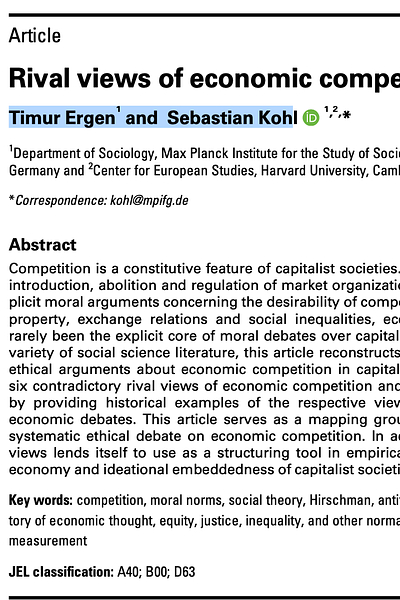Welcome to this week’s edition of the podcast. If you like what we’re doing, consider becoming a paid subscriber. If you’d rather not, you can offer a one-off tip here, or get yourself some merch here. Many thanks for your support!
In this week’s episode, Dmitri Belikov and I discuss one of the fundamental dichotomies of human behaviour: cooperation versus competition. Are human beings inherently competitive, or are we more socially oriented and naturally cooperative? The question is important because the workplace seems primarily oriented towards competition. We compete for a limited number of clients and projects, departments within the same organisation may be adversaries, and workers are encouraged to compete for recognition, bonuses and promotions. In parallel, we also find workers in these same situations cooperate, albeit reluctantly at times, to achieve goals and get things done.
Ultimately, however, jobs require people to be agents of the profit-seeking organisation within a system of apparently limited resources. Making a profit is necessary, but the competition for it never stops, and it’s rarely shared equally among those who generate it (although that’s a topic for another day). Businesses, especially larger corporate ones, are never satisfied, and they demand that you and I, in our jobs, keep pushing for more. They squeeze as much as they can out of every human being, often until we are dry, broken husks of people. In this sense, we work in the metaphorical vice of competition for what are perceived as limited resources (again, a topic for another day).
The Capitalists argue that competition is good for society; it has given us all the technology, goods and services we take for granted. It has improved living conditions and made life better for all, or so the argument goes. Socialists offer a counterargument - competition has destroyed the fabric of life, raped and pillaged the planet, treated human beings and the natural world as objective means to material ends, and will kill us all. Cooperation and mutual aid, they say, are the keys to our survival.
Capitalists suggest that the key to economic success is ‘fair’ competition. Once there is fair competition, it will stimulate creativity, innovation, economic growth and jobs for all. Who could argue with that? The only thing is, this seems to be more of a marketing message than reflective of the truth. Vested interests flout the law, vie for advantage at every turn and employ aggressive, underhanded tactics to get what they want. Global investment funds modify the trajectory of markets with big buy-and-sell plays. Large companies buy smaller ones, and slowly but surely, the global conglomerate becomes less prone to influence from any single national agency. Once they are global, they can do what they like. Many organisations demand a certain level of productivity from their staff, and if you find yourself in the bottom 10 per cent of productivity, you’re out.
In addition, the impact of their activities on people and the environment are treated as externalities, acceptable costs incurred in the competitive process, which will, they say, eventually level out1. In this purely objectivist view of reality, compensation for these “acceptable costs” hardly ever seem to be paid by the organisations that initiate them. As if monetary compensation can counter the psychological and emotional damage to a family or broader community when the primary breadwinners lose their jobs, when the water system in a town is poisoned2, or a river in the Amazon is polluted beyond recovery3. See Steven Donziger for more on this latter point.
The Capitalist imperative is built on the premise that competition is good. But as we discuss in this episode, another question arises here: Is there competition at the top of the heap, or is it only for all of us? In this sense, the big boys seem to collaborate in their deceit and manipulation of markets and the workplace. The global economic crash of 2008 and its aftermath illustrate this perfectly. The speculative financial markets not only broke the systems almost completely, but they also took public bailout money, and pretty much no one of significance went to prison. As we can see, profit at all costs is the driving feature of the system, so why should any of this surprise us? Leo E. Strine, Jr., American attorney and retired judge for the state of Delaware, wrote the following after a decision in the eBay v. Newmark case from a few years ago4.
Side note: eBay was a minority shareholder in Craigslist, and the founders had set out to ensure that any future takeover attempt by eBay did not modify Craigslist’s community and social culture. The court found, however, that Craigslist’s social imperative breached its fiduciary duty by unfairly disenfranchising eBay as a minority shareholder. My words are in parentheses below.
“Although I am sympathetic to many of the sentiments and policy concerns that motivate these dismayed reactions [the outrage against ethical and moral breaches made by for-profit corporations], I confess to being weary of the naïveté they manifest. More importantly, the continued failure of our societies to be clear-eyed about the role of the for-profit corporation endangers the public interest. Instead of recognising that for-profit corporations will seek profit for their stockholders using all legal means available [and illegal means once they think they can get away with it], we imbue these corporations with a personality and assume they are moral beings capable of being “better” in the long run than the lowest common denominator. We act as if entities in which only capital has a vote will somehow be able to deny the stockholders their desires, when a choice has to be made between profit for those who control the board’s reelection prospects and positive outcomes for the employees and communities who do not.”
Competition and cooperation can work together to afford everyone the same opportunities and benefits. I have seen it working in the domain of sport all my life and see no reason why it can’t work successfully in the domain of daily work. However, the problem seems to be twofold. First, many of us believe in the scarcity myth—there simply isn’t enough to go around (what bullshit!). Others who hold power and control are obsessed with self-interest, are perhaps even psychopathic, and have little or no empathy for others. The latter, I believe, is our biggest challenge.
References
Ergen, T., & Kohl, S. (2022). Rival views of economic competition. Socio-Economic Review, 20(3), 937-965.
Lerner, S. (2015). The Teflon Toxin. The Intercept, series available online at https://theintercept. com/series/the-teflon-toxin/(accessed September 4, 2018).
Mella, R. A. (2016). The Enforcement of Foreign Judgments in the United States: The Chevron Corp. v. Donziger Case. NYUJ Int'l L. & Pol., 49, 635.
Boatright, J. R. (2017). The corporate objective after eBay v. Newmark. Business and Society Review, 122(1), 51-70.














